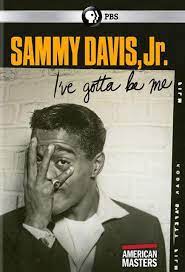
SAMMY DAVIS JR.: I'VE GOTTA BE ME
US, 2017, 100 minutes, Colour.
Directed by Sam Pollard.
This is a fine portrait of Sammy Davis Jr. It is part of the very interesting American Masters television series. Director Sam Pollard has a long history of producing and directing documentaries. Writer, Lawrence Masilon, has also written a number of documentaries including Richard Rogers for American Masters.
This is an interesting film even for those who know very little about Sammy Davis Jr or for whom he is a media personality of the past. Since he started in show business when he was a little boy, there is a vast amount of footage for the filmmakers to choose from, early short films where he danced with Ethel Waters at the age of eight, Rufus Jones for President. There is also footage when he toured the United States with his father and his Godfather, calling him in his uncle, a trio of tap dancers who, especially after the war, was celebrated on the main American television shows. There was great praise for Sammy himself, especially from Eddie Cantor who promoted him and became something of a father figure to him. Jerry Lewis and Billy Crustal offer very personal memories.
One of the things that Sammy Davis Jr regretted was that he had no schooling, no education, finding it difficult to write, even to spell. That did not prevent him from being articulate and writing some of his own material. There is sadness in listening to his reminiscences about his being called up, the personal and racial attacks, violent, on him in the armed services.
While the film shows the extraordinary range of his talent, there are some highs and lows in his political connections, JF Kennedy’s friendship with the Rat Pack and his not inviting Davis to his inauguration celebrations. This is in contrast with a decade later and Sammy Davis Jr’s endorsement and literal embrace of Richard Nixon. Criticisms were made during Davis’s time, especially the connection with the Rat Pack, that he really wanted to be white. There is also the mixed reaction to his entertaining the troops in Vietnam – and his declarations of not approving the war but of supporting the young men who went to fight there.
There are various sequences of his friendship with Frank Sinatra and Dean Martin, singing with them, clowning with them, making films with them, although Joey Bishop and Peter Lawford appear in some of the dance routines and on the posters, they do not get much attention or mention.
There are the issues of his marriage, a small show marriage to a black woman, his falling in love with Mai Brett, their marriage, reported at the time, hostilities towards interracial marriage. But, as with so many show business personalities, with his preoccupation with performance and travel, the marriage fell apart. There were also his problems with drugs and alcohol, especially in his finally being hospitalised and his death from cancer at 64.
However, most of the film is a celebration, with successive headings to illustrate his talent as a dancer, an extraordinary tap dancer, even dancing with Gregory Hines at the final celebration of his 60th birthday. Then there is his singing, a strong voice, able to take on any kind of song – and his joy at playing This Sporting Life in Porgy and Bess and singing It Ain’t Necessarily So.
He was also a television personality, eager to go on as many shows as possible, Lucille Ball, Patty Duke… Sometimes acting as himself, sometimes doing the song and dance routine.
He was also in many films though this documentary underplays his series with the Rat Pack, just showing him in the posters. However, singing in film combined with his singing the Candyman for Willy Wonka – and it becoming, from the 70s, one of his signature songs, the film showing a variety of his performances of the song.
He also found a talent for mimicking and impersonations – and a number of these are incorporated, especially with Humphrey Bogart who took time out to discuss how to impersonate him better. There are some criticism of him impersonating a range of white actors like James Stewart.
There is also his concern and social outreach, and his patriotism.
For those who admire Sammy Davis Jr, they will find this a wonderful tribute. For those who did not know him well, this is a fine introduction to him and the range of his talents.